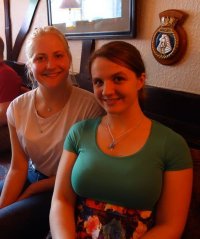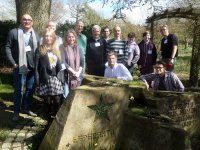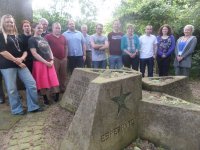This is my second visit to the scenic village of Barlaston, home to Esperanto House, base of the Esperanto Association of Britain (EAB) and its Butler Library, which houses an impressive collection of literature from across the world and translated into Esperanto, as well as a bookshop used to sell new material and second-hand books.
The course Lernu Plu means “keep on learning”, and is pitched as a next step up for beginners – you’re assumed to know the word for “hello” and be able to use both past and future tense in conversation.
The instructors are friendly and the day starts with Viv, the administrator and caretaker-in-chief of Esperanto House, supplying everyone with hot or cold drinks, and making sure there are enough paper and pens for everyone. Every participant in the course has a name badge, including the teachers, so being bad with names is no excuse not to come and experience the wonderful hospitality of Esperanto House.
The day starts with some basic conversation. One of my fellow students has been to a Lernu Plu before, though I’m under the impression at the time that several have, so I initially feel very out of my depth. However, the instructors Tim and Ian step in and help unravel my tongue, and after a few hour-long lessons and several tea breaks, I’m feeling comfortable with Esperanto again. Not bad for only my second time in this environment!
The lessons consist of working through poems and songs, as well as a discussion of the meaning behind them and grammar points – these are mostly humorous or of historical value, and remain interesting throughout. Videos are also used to underline grammatical points, and just before the end of the day there’s a full-blown presentation in Esperanto about one of the leading Britons when the language was first becoming popular in the UK. The presentation is given wholly in Esperanto and I’m able to follow along and understand roughly 80% of the words used. Where I don’t understand, the instructor already seems to know that the sentence is tricky and automatically rephrases the Esperanto so that I can pick up the meaning.
The first day wraps up with a nice pub steak dinner (there are vegetarian options available) and a lengthy chat with my fellow students and instructors about the future of Esperanto in Britain and across the world, as well as other more mundane, everyday topics of conversation.
Partoprenantoj de Lernu kaj Lernu Plu en aprilo, de maldekstre: Stephen Picksley, Christabel Godlewska, Malcolm Jones, Kelly Payne, Andy Pepperdine, Ian Carter, Pete Cookson, Martin S Taylor (surgenue), Anthony Bodineau, Tom Roche, Matthew Roche, Jack Edwards (surgenue), Dave Sumpter.
The second day (from 10am to roughly 2pm) is spent mainly in discussions of finer points of grammar, to answer questions raised throughout the first day, and with another presentation given in Esperanto. A group photograph is also taken to commemorate the first time many of us have met. The library and bookshop is explored again, and all learners receive free dictionaries and mugs.
All in all, a perfect pair of courses for a beginner – Lernu introduces you to the language and grammar, while Lernu Plu expands on these, allowing you to drill a little deeper into both the grammar and the history of Esperanto. Because of the way they work together, I would advise any komencanto (beginner) to first attend a Lernu session, even if your grammar and understanding are already very good. Even though Lernu is aimed at complete beginners, many komencantoj have never spoken Esperanto before, even if they have practised using Duolingo.
Partoprenantoj en julio, de maldekstre: Stephanie Arteaga, Marcus Richardson, Kat Newbould, Ian Carter, Simon Whiteley, Christopher Lewis, Malcolm Jones, Jack Edwards, Adam Hall, Saira Hall, Scott Berry, Catherine Sarquis, Alina Mironova. Ĉeestis pluraj aliaj kiuj ne troviĝis en la foto.
After completing both a Lernu and a Lernu Plu, you will have covered most of the grammar points in the Teach Yourself Esperanto book and, with the help of the tutors and fellow students, will be well equipped to continue your journey into Esperanto and its world.
Big shout-out to Tim, Viv, Ian and Malcolm for maintaining Esperanto House in Barlaston as a helpful, hospitable place where all are welcome to come and explore this fabulous language!
En aprilo kaj julio okazis en Barlastono sesioj de la kursaro Lernu kaj Lernu Plu. La kurso senkostas kaj donas al la studentoj 9–10 horojn da studado.
Unu el la studentoj, Kat Newbould, eklernis Esperanton pere de Duolingo. Ekde tiam ŝi ĉeestis unu sesion de Lernu kaj alian de Lernu Plu, kaj ankaŭ partoprenis kurson en Greziljono.
Ni publikigas ŝian resumon de la aranĝoj esceptokaze en la angla, por pli faciligi la komprenon por tutaj novuloj, kiuj eble legos tiun artikolon, kaj por espereble kuraĝigi ankaŭ ilin partopreni venontan sesion.
Okazos plia senpaga sesio de Lernu/Lernu Plu en Barlaston la 15-an kaj 16-an de oktobro. Se vi interesiĝas partopreni kaj sperti mem, vi povas legi pli pri la kursoj kaj mendi vian lokon ĉe esperanto.org.uk/events/lernu.
Ĉi tiu artikolo aperis en La Brita Esperantisto de aŭtuno 2016.




